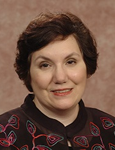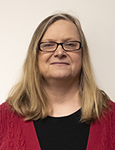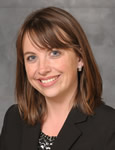A recording of this presentation is available.
Click the button to the right to access the session archive.
Access/download any related materials/handouts
from this session by clicking the button on the right.
24th Annual TCC | Online Conference | April 16-18, 2019
Sustainable Learning, Accessible Technologies, & Diverse Contexts
 Frances Pistoresi, University of Phoenix, Online, USA
Frances Pistoresi, University of Phoenix, Online, USAA recording of this presentation is available.
Click the button to the right to access the session archive.
Access/download any related materials/handouts
from this session by clicking the button on the right.
While these students bring positive attributes to the online classroom, there are also known challenges that may impact student success. A theoretical framework for these challenges can be described using Schossberg’s theory of marginality and mattering (Schlossberg, 1989). Knowledge of the issues involved in military-to-academic transitioning is important for educators, including the possibility of both visible and invisible service-connected disabilities (Tinoco, 2014/2015).
Implications for educators include reflective teaching practices that focus on personal attitudes towards the military and war, female servicemembers, combat experience, and war trauma (Department of Veterans Affairs, 2009). Specific teaching practices and knowledge can support these students, including “welcoming in” behaviors, familiarity with campus resources, utilizing referrals, managing frustrating classroom scenarios, and recognizing the unique obligations of those in the military (Maryland Veterans Resilience Initiative, 2014). Androgogical approaches to teaching and learning involve strategies in course design and online instruction, as well as possible modifications in individual teaching behaviors; these are useful in all disciplines (Smucny & Glover, 2013), validating the importance of professional development in this area.
 Claire DeCristofaro, Ashford University, California, USA
Claire DeCristofaro, Ashford University, California, USA Cole McFarren, Ashford University, Iowa, USA
Cole McFarren, Ashford University, Iowa, USAA recording of this presentation is available.
Click the button to the right to access the session archive.
Access/download any related materials/handouts
from this session by clicking the button on the right.
 Mary Hricko, Kent State University, Burton, Ohio, USA
Mary Hricko, Kent State University, Burton, Ohio, USAA recording of this presentation is available.
Click the button to the right to access the session archive.
Access/download any related materials/handouts
from this session by clicking the button on the right.
 Cara Metz, Ashford Unveristy, San Diego, CA, USA
Cara Metz, Ashford Unveristy, San Diego, CA, USA Sarah Jarvie, Colorado Christian University, Lakewood, CO, USA
Sarah Jarvie, Colorado Christian University, Lakewood, CO, USAA recording of this presentation is available.
Click the button to the right to access the session archive.
 Miri Shonfeld, Kibbutzim College, Tel Aviv, Israel
Miri Shonfeld, Kibbutzim College, Tel Aviv, IsraelA recording of this presentation is available.
Click the button to the right to access the session archive.
Access/download any related materials/handouts
from this session by clicking the button on the right.
InfoTCC Hawaii, LearningTimes, & the Learning Design and Technology (LTEC) Department, College of Education, UH-Manoa, collaborate to produce this event. Volunteer faculty and staff worldwide provide additional support. TCCHawaii.org, a Hawaii nonprofit corporation, conducts events for educators and graduate students worldwide relating to current and future practices and research in learning technologies and design. |
Login[login-with-ajax] |